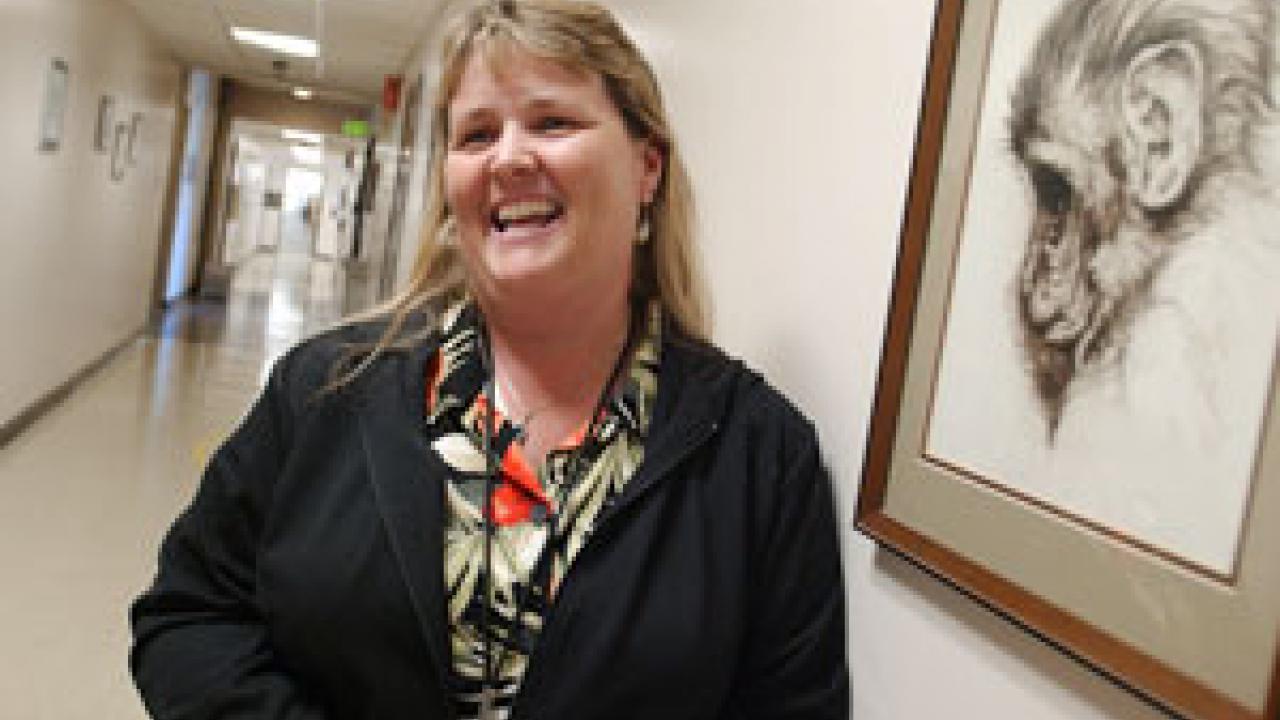It is baby monkey season, and Jenny Short talks about the furry little ones like a parent would.
"It's a huge commitment and responsibility that we have here," said Short, the research services manager for the California National Primate Research Center. "Right now it's spring and we're taking care of more than 600 infant monkeys in our nursery."
That's in addition to the 4,700 monkeys at the primate center used in research and breeding. The majority of these monkeys are rhesus macaques (Macaca mulatta), with small populations of cynomolgus monkeys (Macaca fascicularis) and South American titi monkeys (Callicebus moloch).
"We give the monkeys the best care and comfort possible," said Short, adding that the animals require attention 365 days a year, seven days a week, and 24 hours a day. "The staff is very committed to the well-being of the monkeys that live here."
It shows. The Association for Assessment and Accreditation of Laboratory Animal Care International recently singled out the primate center as a "model of excellence" and described its "environmental enrichment" programs as "outstanding" — no mere compliment from an association known for its strict interpretation of regulatory guidelines.
Toys aside, serious work is being done at the California National Primate Research Center, a biomedical research facility dedicated to improving human and animal health. It is part of a network of eight national primate research centers sponsored by the National Center for Research Resources, a division of the National Institutes of Health (NIH).
Short averages around 60 working hours a week at the center — and that is just fine with her. "It's self-imposed. This is one of the most incredible jobs anyone can have."
But it is consuming. "All of our supervisors carry pagers," she said. "A quick response is important."
Nick Lerche, interim associate director for Primate Services and researcher, describes Short as "a natural leader, skilled manager and creative problem solver."
He noted, "She never loses sight of the fact that she has three unique but equally important constituencies — the animals, the animal care and research support staff, and the investigators and their research."
'We keep them busy'
Short has long prepared for this role. She attended UC Davis in the early 1980s, when she worked part-time at the primate center — "I was a college student who needed money" — and got hooked on the place. "The science is so fast-paced, dynamic and revealing."
After she graduated in 1982 with a degree in food animal production, Short worked as a staff research associate at the primate center and then in other positions, even serving as a management services officer along the way.
Short said one program with great impact is the "enrichment" program. A staff of four enrichment specialists is dedicated exclusively to promoting the psychological well-being of the animals at the center.
For example, the center's staff will give the animals "forage boards" containing rice, popcorn and peas, setting them in front of the cages. "They pick at the food, just like they would do in the wild," said Short.
Other enrichment "toys" include swings and tires, "things to keep them busy, and that often involves food," said Short, herself a mother of three daughters. "Child-rearing, you see, is my hobby."
The monkeys even get to watch videos. "They like nature shows and cartoons, just like small kids," said Short. "They don't like human-oriented shows, C-SPAN or ESPN."
Improving human health
Viewing habits aside, animals like these have played major roles in many of the medical breakthroughs of the past century. Short noted that some current projects involve ways to combat asthma and the spread of AIDS.
"Data and information on asthma research is being used right now on a daily basis by physicians who treat children for these disorders," said Short, noting the uniqueness of the UC Davis system with its medical school, health system, veterinary school, primate center, and campus-based agricultural and environmental research.
Supporters of animal testing point out that such research has helped develop vaccines against diseases like rabies, polio, measles, mumps, rubella and tuberculosis. Antibiotics, HIV drugs, insulin and cancer treatments rely on animal tests.
However, critics of animal testing express concern about the humane handling of the critters.
Raising the animal care bar
To this end, the primate center has six staff veterinarians, one veterinary resident and animal technicians providing state of the art care and research support. Staff feed the animals, clean the cages, transfer animals and monitor them for any illness or unusual behaviors.
"We have a heavy regulatory burden that we have to follow," said Short. "But the monkeys' care is probably better than what many humans in some places receive."
As she points out, the U.S. Animal Welfare Act sets strict standards for all aspects of care and research for laboratory animals. And, all research facilities are regulated by the U.S. Department of Agriculture.
It all comes down to the human touch, she said. Creating a positive workplace and offering additional employee training is a priority. "In 2003 we made a decision to enhance our on-site training capabilities throughout the center," said Short.
Now, for example, a full-time training coordinator instructs staff in the finer points of animal husbandry. As a result, three staff members this month passed the credentialing test given by the American Association for Animal Laboratory Science.
Lerche says Short was the "driving force" behind establishing the additional staff training that provides "a clear path for staff advancement, and a greater recognition among staff of laboratory animal husbandry as a career."
He added, "It has improved morale and fostered a sense of professionalism among the staff, to the great benefit of the center's primate population and research objectives."
As Short puts it, "We pay attention to our people as well as monkeys."
Media Resources
Clifton B. Parker, Dateline, (530) 752-1932, cparker@ucdavis.edu
